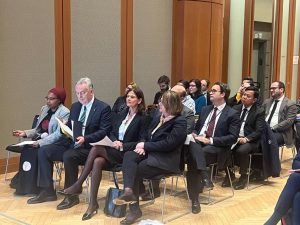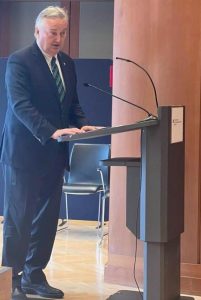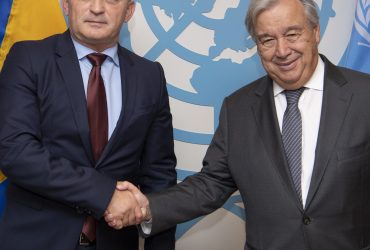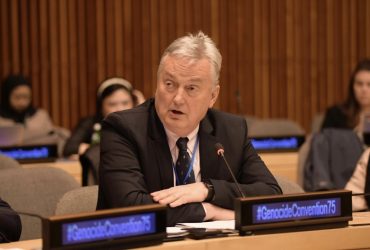75th Anniversary of Genocide Convention Commemorated with Calls for Global Vigilance and Action
 The Permanent Mission of Germany in New York hosted a side event in commemoration of the 75th anniversary of the Convention on the Prevention and Punishment of the Crime of Genocide. Attended by delegates from various nations, the event highlighted the enduring importance of the Convention in preventing atrocities and seeking accountability.
The Permanent Mission of Germany in New York hosted a side event in commemoration of the 75th anniversary of the Convention on the Prevention and Punishment of the Crime of Genocide. Attended by delegates from various nations, the event highlighted the enduring importance of the Convention in preventing atrocities and seeking accountability.
Ms. Alice Wairimu Nderitu, Under-Secretary-General and Special Adviser on the Prevention of Genocide, opened the session, emphasizing the necessity of renewing global commitments to prevent genocide. Dr. Christoph Safferling, Director of the International Nuremberg Principles Academy, delved into the pivotal elements of the 1948 Convention, underscoring its role in promoting prevention and accountability.
Representatives of co-sponsoring countries from Poland, Germany, Israel, Cambodia, Rwanda and Bosnia and Herzegovina, shared insights, affirming their commitment to the Convention’s principles and highlighting its impact at national and international levels. The session also provided an open floor for Member States to voice their perspectives on the Convention’s implementation and future directions in combatting genocide and Holocaust denial.
In his address, dr Zlatko Lagumdzija, Permanent Representative of BiH to the UN underscored the significance of translating commemorative events into concrete actions, expressing gratitude to the USG and Special Advisor on the Prevention of Genocide for their dedication and to the Permanent Mission of Germany for hosting the event.
Referencing Edmund Burke’s warning, Lagumdzija highlighted the failures during the Srebrenica genocide when the international community remained inactive, stressing the urgent need to learn from such tragedies and prevent their recurrence. He paid tribute to individuals like Raphael Lemkin, whose determination led to the establishment of ‘Genocide’ in international law through the Convention, emphasizing the immeasurable contributions of these figures.
 Lagumdzija accentuated the pivotal role of the Convention in recent history, citing landmark convictions for genocide perpetrators in Rwanda and Bosnia and Herzegovina. He emphasized the educational aspect, advocating for the integration of genocide verdicts into classrooms, echoing Benjamin Disraeli’s assertion that “Justice is truth in action.” In a time marked by denial and fabricated misinformation, Lagumdzija stressed the importance of championing truth, justice, and education to combat genocide effectively.
Lagumdzija accentuated the pivotal role of the Convention in recent history, citing landmark convictions for genocide perpetrators in Rwanda and Bosnia and Herzegovina. He emphasized the educational aspect, advocating for the integration of genocide verdicts into classrooms, echoing Benjamin Disraeli’s assertion that “Justice is truth in action.” In a time marked by denial and fabricated misinformation, Lagumdzija stressed the importance of championing truth, justice, and education to combat genocide effectively.
In closing remarks he pointed out some lessons learned after Srebrenica genocide verdict were made: “Since almost two decades ago when first guilty verdict for the crime of genocide committed at Srebrenica in 1995, most notably ICTY Appeals Chamber judgment of April 19, 2004 (The Prosecutor vs. Krstic), I use every opportunity to remind us that it is high time that we move genocide verdicts from the court rooms to the classrooms.”
For Lagumdzija, the keywords of December 9—Prevention, Truth, Justice, and Education—are paramount in the ongoing battle against denial, impunity, and ignorance, ultimately aimed at preventing genocides. He emphasized the collective responsibility of humanity in this enduring struggle and viewed December 9 as a poignant reminder and milestone in this ongoing fight.
The speech concluded with a resounding call for continued dedication to building a shared future devoid of the darkest times in history, solidifying the resolve to prevent such atrocities from ever occurring again.
“We – individually, collectively, institutionally – together. We – civilization, humanity – are in constant race between Truth, Justice, Education and Prevention, against Denial, Impunity, Ignorance, and ultimately Genocide.”
In her closing remarks, Ms. Nderitu reiterated the urgency of sustained efforts in upholding the Convention’s legacy and stressed the need for collective action to prevent genocide worldwide. The event served as a platform to reinforce the significance of the Convention in the contemporary global landscape, emphasizing its role as a beacon for preventing the gravest crimes against humanity.
dr Zlatko Lagumdzija, speech on the occasion of
December 9, International Day of Commemoration and Dignity of the Victims of the Crime of Genocide and the Prevention of this Crime
Side Event in Commemoration of the 75th Anniversary of the Convention on the Prevention and Punishment of the Crime of Genocide
Excellences, Ladies, and Gentlemen,
This event is timely and extremely necessary in today’s tumultuous world – to do the talk but also do the walk along Prevention and Punishment of the Crime of Genocide. We need to celebrate milestones such as this and translate them into action and make them count when needed the most. So I thank the USG and Special Advisor on the Prevention of Genocide for her determination and persistence, and to the Permanent Mission of Germany for hosting and cosponsoring with us this event.
For this reason, allow me to remind you of the warning words attributed to Edmund Burke: “The only thing necessary for the triumph of evil is for a few good men to do nothing.” Indeed, we have witnessed an uncomfortable number of times when these were, in fact, quite true. And came at a high cost. On our part, we take every opportunity to remind of the failures in Bosnia and Herzegovina when the international community, including United Nations, looked away during the Srebrenica genocide in Bosnia and Herzegovina, effectively allowing evil to triumph. We do it for the sake of lessons we urgently need to learn and stop repeating to anyone anywhere anytime in the future.
Fortunately, in the world of Raphael Lemkins and Willy Brandts, Benjamin Ferenczs and Antonio Casseses words of Edmund Burke have a short life. But their courage, perseverance, and humanity left a legacy and lessons for the ages, an example and a beacon for all of us unwilling to compromise on humanity and justice.
For this alone, contributions such as Lemkin’s are immeasurable. The outcome of Lemkin’s personal crusade to establish ‘Genocide’ in international law through a binding Convention became his legacy.
Genocides in Srebrenica and against the Tutsi in Rwanda mark some of the darkest chapters in modern human history, where the Genocide Convention was invoked in service of accountability for the crime of genocide and to support the prevention of it. Both gave life and a voice to the Genocide Convention.
The first-ever official conviction for genocide under international law was in case of Jean-Paul Akayesu, for acts he engaged in and oversaw as mayor of the Rwandan town of Taba.
And, in addition to 8 judgments rendered by the ICTY on genocide in Srebrenica, a landmark judgment by ICJ was rendered in the case of Bosnia and Herzegovina vs. Serbia and Montenegro. It was the first time since the Genocide Convention was adopted in 1948 that the ICJ heard and issued a judgment that a State was actually held responsible for violating the Convention.
Through these judgments came, in fact, the greatest realization of Lemkin’s life-long work.
Today, there is no Law School or discussion on human rights, any conversation of World War II, or any subsequent Genocides that does not mention his name. Therefore, December 9, International Day of Commemoration and Dignity of the Victims of the Crime of Genocide and of the Prevention of this Crime, and for that matter, even April 7 – the International Day of Reflection on the Genocide against Tutsi in Rwanda, is as much a commemoration of Lemkin’s life and legacy as it is a monument for all those who fell victim to evil.
But more importantly, it should stand as a testament to our dedication for this crime never to be forgotten, a commitment to learn from past mistakes, a commitment to prevent, to punish, and always warn against it. Because the Genocide Convention enabled us to do so. And because one good man made it possible. And we can do even more – but only together – by learning, understanding and respecting (UN defined) international law (and order).
Let me conclude with reflection on importance of December 9, International Day (of Commemoration and Dignity of the Victims of the Crime of Genocide and the Prevention of this Crime) that I learned after Srebrenica genocide judgments (verdicts) were made.
Since almost two decades ago when first guilty verdict for the crime of genocide committed at Srebrenica in 1995, most notably ICTY Appeals Chamber judgment of April 19, 2004 (The Prosecutor vs. Krstic), I use every opportunity to remind us that it is high time that we move genocide verdicts from the court rooms to the classrooms.
At the same time words of Benjamin Disraeli, British Prime Minister, statesman and novelist, back in 1851, “Justice is truth in action”, are resonating today more then ever before in modern history. In time marked by denial of genocide, brutally fabricated fake news and ultimately violation of international law in such a great crimes like crime of genocide, we have, collectively, to double down the truth, justice and education on committed crimes of genocide as a major building blocks of Prevention of this Crime.
Commemorations like this one are not only about our past but after all they are about our actions in building shared future without darkest times – the times that we want to leave in history and do not to let them being repeated never (and ever) again.
This is why 4 prime keywords of December 9 International Day (of Commemoration and Dignity of the Victims of the Crime of Genocide and the Prevention of this Crime), for me are not Genocide but Prevention, not Denial but Truth, not Impunity but Justice, and last but not least important not Ignorance but Education.
We – individually, collectively, institutionally – together. We – civilization, humanity – are in constant race between Truth, Justice, Education and Prevention, against Denial, Impunity, Ignorance, and ultimately Genocide.
December 9 is just another reminder and landmark in our struggle that we will never stop.
Thank you.
Thank you.



